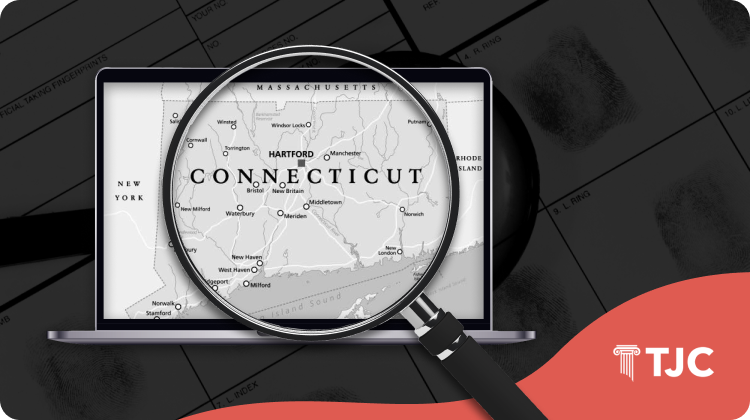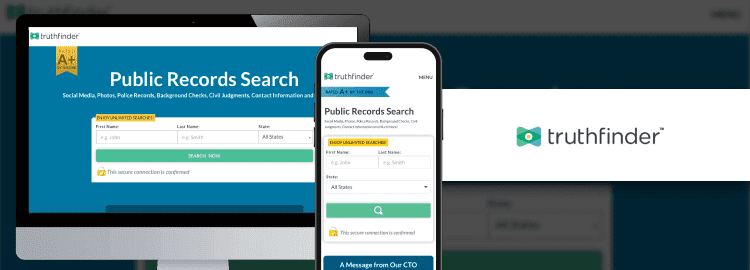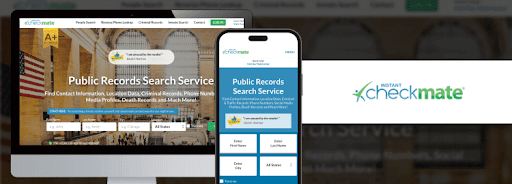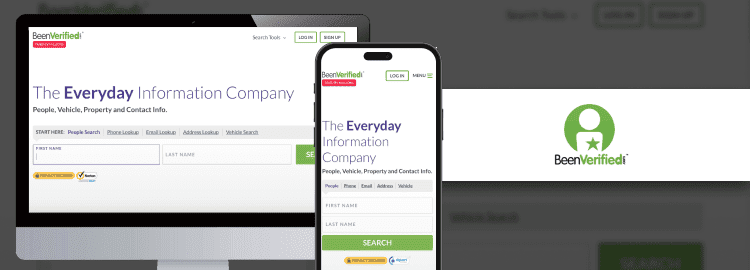Background Check in Connecticut: CT Screening Process & Laws

Conducting a background check in Connecticut involves examining an individual’s criminal, employment, and educational history to verify their suitability for employment, housing, or other purposes. These checks are crucial for employers, landlords, and other entities to ensure the reliability and safety of individuals in their respective roles.
In this article, we will explain what a Connecticut background check includes, how to get one, the types of information it reveals, and the relevant laws and regulations. We will also highlight the best services available for conducting background checks in Connecticut to ensure you are fully informed and compliant with state and federal laws.
Need a Background Check?
Get StartedWhat Is a Connecticut Background Check?
A Connecticut background check is a process used to verify an individual’s criminal, employment, and personal history within the state. It typically involves reviewing records from law enforcement, court systems, and other relevant agencies to ensure the person meets specific criteria for employment, housing, or other purposes. These checks help organizations make informed decisions about hiring, renting, or other engagements by providing a comprehensive view of an individual’s past.
How Do I Get a State Background Check in Connecticut?
To get a state background check in Connecticut, follow these steps:
- Determine the Type of Background Check Needed: Identify whether you need a criminal background check, a tenant screening, or another type of check.
- Apply for the Background Check: For general purposes, you can apply through the Background Check Information System (BCIS) or similar platforms. For child-related checks, contact the Department of Children and Families (DCF).
- Submit Required Information: Provide necessary details such as personal identification, authorization forms, and specific details about the type of check required.
- Wait for Processing: After submitting your application, wait for the processing of the background check. This could take a few weeks depending on the type of check and the volume of requests.
- Receive the Results: Once the background check is complete, you will receive the results via email or through the specified method of communication.
What Shows up on a Connecticut Background Check?
A Connecticut background check can reveal a comprehensive range of information depending on the specific type of check performed. Here’s what you can typically expect to find:
Criminal Background Checks
Criminal background checks, conducted by the state police bureau, provide detailed information about an individual’s criminal history. These checks include records of felony and misdemeanor convictions, arrest records, pending charges, outstanding warrants, and sex offender registry status.
This information is essential for assessing an individual’s criminal past and evaluating potential risks. Employers often use this data from the state police bureau to ensure the safety and security of their workplace.
Education Verification
Education verification confirms the educational credentials claimed by an individual. This check validates the schools attended, degrees earned, dates of attendance and graduation, and any certifications and honors received.
It is essential for ensuring that the individual has the educational background they claim. Accurate education verification helps employers confirm that candidates meet the educational requirements for the position.
Civil Court Searches
Civil court searches provide insights into an individual’s non-criminal legal matters. This includes lawsuits, legal disputes, bankruptcy filings, restraining orders, and divorce proceedings. Such information helps in assessing any significant legal issues that may impact the individual’s suitability for certain positions or responsibilities. This data is especially relevant for roles that require high levels of trust and integrity.
Drug Testing
Drug testing identifies the presence of illegal substances in an individual’s system. The results typically show the types of drugs tested for, such as marijuana, cocaine, and amphetamines, along with the test outcomes (positive or negative) and the date of the test. This is often used by employers to ensure a drug-free workplace. Regular drug testing can help maintain a safe and productive working environment.
Employment Verification
Employment verification confirms an individual’s work history. This check includes details about previous employers, job titles and roles, dates of employment, reasons for leaving, and overall performance and conduct.
Verifying employment history helps ensure that the candidate has the professional experience they claim. It also assists in identifying any inconsistencies or gaps in employment that need further clarification.
Credit Background Checks
Credit background checks provide an overview of an individual’s financial history. This includes their credit score, outstanding debts, loan and credit card accounts, payment history, and any bankruptcies or liens. This information is particularly important for positions that require financial responsibility. Employers use this data to assess the financial reliability and trustworthiness of a candidate.
Driving Record Checks
Driving record checks provide a history of an individual’s driving behavior. This includes traffic violations, DUIs or DWIs, the status and suspensions of their license, accidents, and any points on their license. These checks are essential for roles that involve driving or operating vehicles. Employers rely on this information to ensure that candidates have a safe and responsible driving history.
What Are the Background Check Laws and Regulations in Connecticut?
Here’s an overview of the key laws related to background checks in Connecticut.
- Connecticut General Statutes § 31-51i: Employers and consumer reporting agencies (CRAs) must follow strict guidelines when conducting background checks. Employers cannot ask about erased criminal records during the application process, and CRAs must ensure that the information they report is current and accurate. If a background check includes criminal record information, the applicant must be notified, and the CRA must verify that the information is up-to-date.
- Connecticut Fair Employment Practices Act (CFEPA): The Connecticut Fair Employment Practices Act (CFEPA) prohibits discrimination in employment based on race, color, religious creed, age, sex, gender identity or expression, marital status, national origin, ancestry, present or past history of mental disability, intellectual disability, learning disability, physical disability, including, but not limited to, blindness. This law applies to all employers in Connecticut with one or more employees.
- Ban the Box Law (Public Act No. 16-83): This law, known as Ban the Box, restricts employers from asking about an applicant’s criminal history on initial job applications. The goal is to ensure that candidates are evaluated first on their qualifications. Employers can inquire about criminal history later in the hiring process.
- Connecticut General Statutes § 31-51j: This statute requires that employers who conduct pre-employment background checks must comply with specific notification and consent requirements. Employers must notify applicants in writing that a background check will be conducted and obtain the applicant’s written consent.
- Connecticut General Statutes § 31-51k: This statute outlines the requirements for CRAs in reporting criminal record information. CRAs must check with the state’s department of justice to see if any records have been erased and ensure the information is current before disclosing it.
- Federal Fair Credit Reporting Act (FCRA): The FCRA is a federal law that protects the privacy of consumer information held by consumer reporting agencies. It limits the types of information that can be reported and requires employers to notify and obtain consent from applicants before conducting a background check. The FCRA also mandates a two-step adverse action process if negative information is found.
- Connecticut General Statutes § 31-51ll: Grants eligible employees up to sixteen workweeks of family and medical leave within a twenty-four-month period, covering personal or family health conditions and the birth or adoption of a child. Employees can use accrued paid leave during this time and retain their employment benefits. Employers must adhere to notice requirements and accommodate requests for intermittent or reduced leave schedules.
- Connecticut General Statutes § 54-142a: This statute allows individuals to have certain criminal records erased and prohibits employers from inquiring about or using these erased records in hiring decisions. CRAs are also restricted from reporting erased records.
- Connecticut General Statutes § 31-51mm: This statute addresses the issue of discrimination based on erased criminal records. Employers are prohibited from denying employment based solely on an erased record or a record for which the applicant has received a provisional pardon or certificate of rehabilitation.
Local Connecticut Fair Hiring Laws
Connecticut’s fair hiring laws ensure equal job opportunities for all. The Connecticut Fair Employment Practices Act (CFEPA) prohibits discrimination by employers with one or more employees based on protected characteristics.
These include race, color, ancestry, national origin, religion, sex, sexual orientation, gender identity or expression, age, disability, marital status, and more. These laws apply statewide to promote fair and non-discriminatory hiring practices in Connecticut.
How Far Back Does a Background Check Go in CT?
In Connecticut, background checks typically follow the Fair Credit Reporting Act (FCRA) seven-year lookback rule. This means that most background checks will only report information from the past seven years. However, there are exceptions where an employer can look back further, especially for positions with higher responsibilities or salaries.
How Long Does a Background Check Take in CT?
The processing time for background checks in Connecticut can vary. Typically, it takes about five to ten business days to complete a background check. Fingerprint-based checks might take longer due to the need for specialized processing and verification. These checks often require fingerprints to be taken by trained professionals, usually at a police station or similar facility.
How Much Does a Background Check in Connecticut Cost?
The cost of a background check in Connecticut depends on the type of check being conducted. Here are the typical fees:
- State Criminal History Check: $75
- Federal Criminal History Check: $13.25
Not all fees apply to every service. The Federal Criminal History Check, for instance, is only available under specific state or federal regulations.
Where To Get A Background Check In Connecticut?
There are several ways to get a background check in Connecticut, depending on your needs:
- Connecticut State Police: For official state criminal history records.
- Online Background Check Services: Offer comprehensive checks for personal purposes and include criminal records, social media profiles, and more.
- Local Law Enforcement Agencies: You can request criminal history information from local police departments or sheriff’s offices, particularly for specific jurisdictions within Connecticut.
These methods provide various levels of detail and coverage to suit different purposes, from personal inquiries to official employment screenings.
Best Background Check Sites
Finding the right background check service is essential for making informed decisions, and these trusted websites can help you get the information you need.
- TruthFinder – Best for Deep Insights
- Instant Checkmate – Best for Thorough Profiles
- BeenVerified – Best for Fast Checks

TruthFinder is a top choice for background checks. It scans hundreds of millions of public and private records, providing detailed reports in minutes. It offers extensive information, including social media profiles, arrest records, and contact details, making it more comprehensive than many competitors.
Pros
-
Comprehensive reports including private data
-
User-friendly interface
-
Offers dark web monitoring
-
Mobile app available
-
Monthly membership with unlimited reports
Cons
-
Requires a monthly subscription
-
Additional fee to download reports as PDFs
-
Information limited to U.S. residents
-
Pop-up ads on the website
Star Rating
/ 5.0

Instant Checkmate offers comprehensive reports that include criminal records, social media activity and address history. Instant Checkmate provides an easy-to-use platform that delivers detailed results, ensuring users have access to a wide range of information to make informed decisions.
Pros
-
Detailed criminal history and social media reports
-
User-friendly dashboard
-
Comprehensive data coverage
Cons
-
Subscription required for full access
-
Some information may be outdated
-
Can be confusing with common names
Star Rating
/ 5.0

BeenVerified provides quick and reliable background information for personal use. It offers various reports, including criminal records and contact details, making it a versatile and affordable tool. The user-friendly platform delivers essential information, helping users make informed decisions quickly.
Pros
-
Fast and reliable report generation
-
Affordable pricing options
-
Large database of information
Cons
-
No identity theft recovery services
-
Limited free information available
-
Requires subscription for detailed reports
Star Rating
/ 5.0
Recap On Connecticut Background Check
Understanding background check laws in Connecticut is essential to protect people’s rights and ensure fair and accurate information collection. Knowing these laws helps you make informed decisions and avoid legal issues.
Using reliable background check services is crucial. Trusted sites like TruthFinder, InstantCheckMate, and Been Verified offer detailed and accurate reports, providing comprehensive information on criminal records, job history, and education. These tools are essential for employers, landlords, and others who need to verify someone’s background.
Reliable background checks lead to safer and more trustworthy communities. Stay informed and make the best choices for your needs.
Disclaimer: Some background check sites are just for personal use and conducting basic people searches. Others, such as those used by potential employers, must comply with the Fair Credit Reporting Act (FCRA). This law limits the types of information you can find on other people. If you’re an employer or landlord using a background check for professional purposes, be sure to choose a site that’s FCRA compliant. Using a people search site that doesn’t comply with the FCRA to screen potential tenants, domestic workers or employees is illegal.
The information available on our website may not be 100% accurate, complete, or up to date, so do not use it as a substitute for your own due diligence, especially if you have concerns about a person’s criminal history. The services we mention do not make any representation or warranty about the accuracy of the information available through our website or about the character or integrity of the person about whom you inquire. For more information, please review each service’s Terms of Use.

